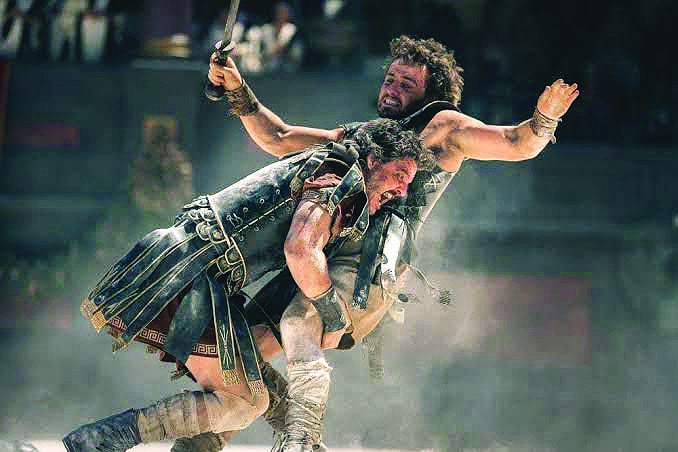
It is said that the Roman Empire crosses the mind of the average male at least once a day. Clearly, this is true for Ridley Scott, as he has returned with a sequel that not only honours its predecessor but also expands on the formula that won five Oscars nearly a quarter-century ago. Gladiator II emerges as a worthy successor, rich in ambition and ruthless in its action.
At the heart of the sequel lies the continuation of a legacy. Paul Mescal (Normal People) steps into the sandals of Lucius, the young boy whisked away to safety in the first film. Now a man, we find Lucius commanding armies in Northern Africa against Roman invaders.
The snake in Rome's garden
Scott has injected new blood into the franchise with Denzel Washington playing Macrinus, a slippery political manipulator whose motivations remain tantalisingly ambiguous. Washington draws on his Shakespearean roots to craft a character who is both despicable and utterly magnetic – a wild card whose unpredictability keeps the audience hooked. Alongside him are Fred Hechinger and Joseph Quinn as the tittering, quixotic twin-emperors Caracalla and Geta, whose shared reign represents the rotten core of the Roman elite. Their performances are enjoyable, though neither rivals Joaquin Phoenix's iconic turn as Commodus in the original film.
As expected, they ramped up the spectacle in this sequel, aiming to please the Roman-like bloodlust of audiences with sharks in the colosseum and rhinos being ridden like steeds. "Are you not entertained?" bellowed Crowe in the first film over several dead bodies. How could we not be? Scott has always known how to serve up a Roman banquet-sized action sequence, and the advancement of CGI has made those elaborate spectacles less plausible, yet equally riveting.
Familiar motifs from the first film make a deliberate return, tying the sequel to its roots. The opening shot echoes the iconic image of Crowe's Maximus running his hand through golden wheat. This time, it is Lucius toying with chicken feed, a rather on-the-nose reminder that these warriors are, at their core, simple men tethered to the earth. They will not fight for power, but they will fight for Rome. The parallels between Maximus and Lucius run deep: both suffer personal tragedies, both find themselves enslaved by the empire they once served, and both channel their rage into the colosseum's blood-soaked sands. Even their combat styles mirror each other, with Lucius employing the same scissoring two-sword decapitation that defined Maximus's fights.
Violence condemned, violence celebrated
But this is more than a simple retread. Beneath its crowd-pleasing veneer, Gladiator II grapples with themes of power, corruption, and the human cost of ambition. The gladiatorial games – those orchestrated days of slaughter meant to entertain the masses – become a microcosm of Rome's moral decay. The emperors used them as a distraction from the populace's suffering and as a convenient means of disposing of enemies. Yet, Scott is keenly aware of the irony here: the games are simultaneously a condemnation of violence and the film's reason for being.
While much of the narrative adheres to a binary view of good versus evil, characters like Pedro Pascal's General Marcus Acacius blur the lines. A decorated soldier with his own code of honour, Acacius provides a counterpoint to Lucius's righteous fury. When the two inevitably face off in the colosseum, it's such a battle of do-gooders that it's hard to get up a rooting interest. Mescal and Pascal can both be wonderful actors in the right role, but they seem ill at ease as beefcake warriors in box-pleated miniskirts. Mescal carries himself well in the action, and brings a wincing, grimacing base note of despair to his righteous rage. But even though he deserves a place in a renaissance painting, he's an actor who works best when he is excavating the tiny, textured details of a character, and this was a role that required a brawnier portrayal. Luckily, Scott realises this and knew when to let Mescal shine during close ups in small-scale scenes, inevitably raising the level of the film above just a brainless action romp.
The spectacle that
never dies
Scott's attention to historical detail remains as sharp as ever. The film lays bare the organised atrocities committed by the blue bloods after the death of Marcus Aurelius, one of the empire's few competent rulers before its fall in 476 AD. The people who invented aqueducts and concrete strong enough to build underwater were also privy to mass executions, enslaving exotic wildlife and starving their own people in order to fund bloodsport games. The twin emperors, for all their absurdities, Caracalla with his pet monkey and syphilitic cackle, Geta with his cold, calculating stare, are emblematic of a leadership far removed from morality – and sanity.
Yet, for all its historical grounding, the film also speaks to contemporary concerns. Scott himself has drawn parallels between the Roman Empire and today's political landscape, noting how power, corruption, and spectacle continue to shape societies. Lucius's question: "Is this how Rome treats its heroes?" resonates far beyond the arena, serving as a critique of systems that exploit and discard their greatest assets.
The trick of movies like Gladiator and the sort of throwback epics that consistently get traction with large audiences, is that their bloodshed and grand speeches provided shelter for a lot of sentimentality – about honour and dying for what you believe in, but also about men unabashedly relishing in the camaraderie of other men. But it's easier to imagine audiences getting riled up over the action than weeping over Gladiator II. As the first film demonstrated, these movies require an earnestness that this new one simply cannot maintain, but it stands as a testament to the enduring appeal of the Roman Empire that may have fallen, but its legacy remains indomitable.


1732170891-0/BeFunky-collage-(79)1732170891-0-165x106.webp)

1729234806-0/Robert-Pattinson-(2)1729234806-0-165x106.webp)

1732172706-0/Express-Tribune-(4)1732172706-0-270x192.webp)











COMMENTS
Comments are moderated and generally will be posted if they are on-topic and not abusive.
For more information, please see our Comments FAQ